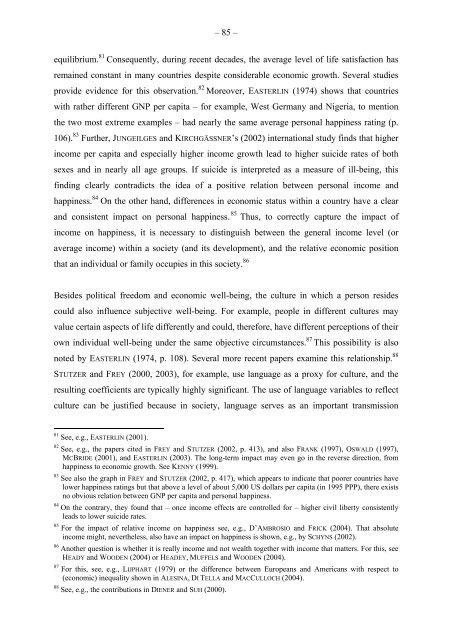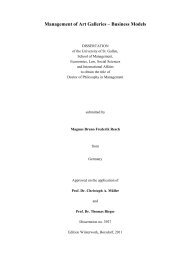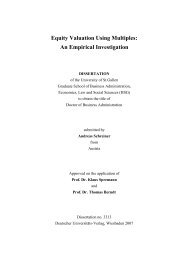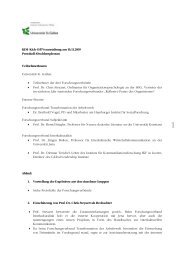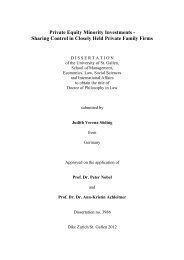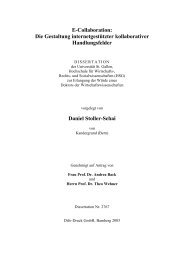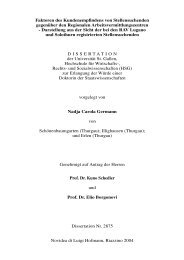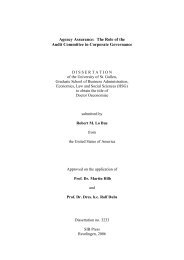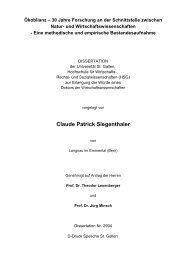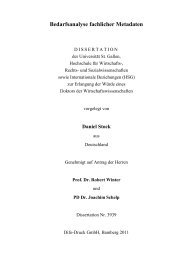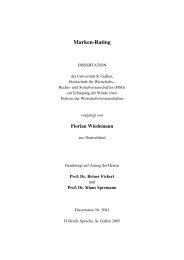The Impact of Direct Democracy on Society - Universität St.Gallen
The Impact of Direct Democracy on Society - Universität St.Gallen
The Impact of Direct Democracy on Society - Universität St.Gallen
- No tags were found...
You also want an ePaper? Increase the reach of your titles
YUMPU automatically turns print PDFs into web optimized ePapers that Google loves.
– 85 –equilibrium. 81 C<strong>on</strong>sequently, during recent decades, the average level <str<strong>on</strong>g>of</str<strong>on</strong>g> life satisfacti<strong>on</strong> hasremained c<strong>on</strong>stant in many countries despite c<strong>on</strong>siderable ec<strong>on</strong>omic growth. Several studiesprovide evidence for this observati<strong>on</strong>. 82 Moreover, EASTERLIN (1974) shows that countrieswith rather different GNP per capita – for example, West Germany and Nigeria, to menti<strong>on</strong>the two most extreme examples – had nearly the same average pers<strong>on</strong>al happiness rating (p.106). 83 Further, JUNGEILGES and KIRCHGÄSSNER’s (2002) internati<strong>on</strong>al study finds that higherincome per capita and especially higher income growth lead to higher suicide rates <str<strong>on</strong>g>of</str<strong>on</strong>g> bothsexes and in nearly all age groups. If suicide is interpreted as a measure <str<strong>on</strong>g>of</str<strong>on</strong>g> ill-being, thisfinding clearly c<strong>on</strong>tradicts the idea <str<strong>on</strong>g>of</str<strong>on</strong>g> a positive relati<strong>on</strong> between pers<strong>on</strong>al income andhappiness. 84 On the other hand, differences in ec<strong>on</strong>omic status within a country have a clearand c<strong>on</strong>sistent impact <strong>on</strong> pers<strong>on</strong>al happiness. 85 Thus, to correctly capture the impact <str<strong>on</strong>g>of</str<strong>on</strong>g>income <strong>on</strong> happiness, it is necessary to distinguish between the general income level (oraverage income) within a society (and its development), and the relative ec<strong>on</strong>omic positi<strong>on</strong>that an individual or family occupies in this society. 86Besides political freedom and ec<strong>on</strong>omic well-being, the culture in which a pers<strong>on</strong> residescould also influence subjective well-being. For example, people in different cultures mayvalue certain aspects <str<strong>on</strong>g>of</str<strong>on</strong>g> life differently and could, therefore, have different percepti<strong>on</strong>s <str<strong>on</strong>g>of</str<strong>on</strong>g> theirown individual well-being under the same objective circumstances. 87 This possibility is als<strong>on</strong>oted by EASTERLIN (1974, p. 108). Several more recent papers examine this relati<strong>on</strong>ship. 88STUTZER and FREY (2000, 2003), for example, use language as a proxy for culture, and theresulting coefficients are typically highly significant. <str<strong>on</strong>g>The</str<strong>on</strong>g> use <str<strong>on</strong>g>of</str<strong>on</strong>g> language variables to reflectculture can be justified because in society, language serves as an important transmissi<strong>on</strong>81 See, e.g., EASTERLIN (2001).82 See, e.g., the papers cited in FREY and STUTZER (2002, p. 413), and also FRANK (1997), OSWALD (1997),MCBRIDE (2001), and EASTERLIN (2003). <str<strong>on</strong>g>The</str<strong>on</strong>g> l<strong>on</strong>g-term impact may even go in the reverse directi<strong>on</strong>, fromhappiness to ec<strong>on</strong>omic growth. See KENNY (1999).83 See also the graph in FREY and STUTZER (2002, p. 417), which appears to indicate that poorer countries havelower happiness ratings but that above a level <str<strong>on</strong>g>of</str<strong>on</strong>g> about 5,000 US dollars per capita (in 1995 PPP), there existsno obvious relati<strong>on</strong> between GNP per capita and pers<strong>on</strong>al happiness.84 On the c<strong>on</strong>trary, they found that – <strong>on</strong>ce income effects are c<strong>on</strong>trolled for – higher civil liberty c<strong>on</strong>sistentlyleads to lower suicide rates.85 For the impact <str<strong>on</strong>g>of</str<strong>on</strong>g> relative income <strong>on</strong> happiness see, e.g., D’AMBROSIO and FRICK (2004). That absoluteincome might, nevertheless, also have an impact <strong>on</strong> happiness is shown, e.g., by SCHYNS (2002).86 Another questi<strong>on</strong> is whether it is really income and not wealth together with income that matters. For this, seeHEADY and WOODEN (2004) or HEADEY, MUFFELS and WOODEN (2004).87 For this, see, e.g., LIJPHART (1979) or the difference between Europeans and Americans with respect to(ec<strong>on</strong>omic) inequality shown in ALESINA, DI TELLA and MACCULLOCH (2004).88 See, e.g., the c<strong>on</strong>tributi<strong>on</strong>s in DIENER and SUH (2000).


